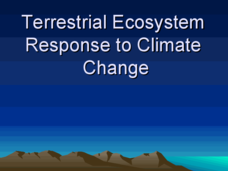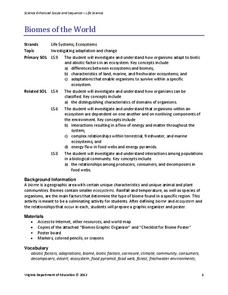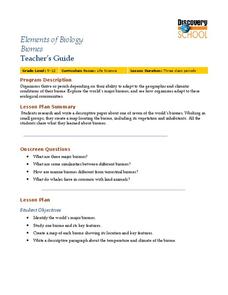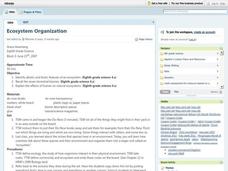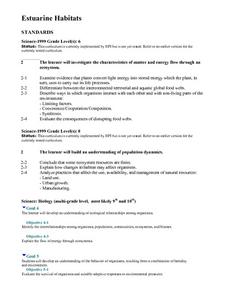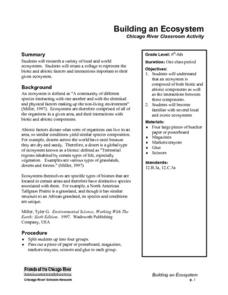Curated OER
Terrestrial Ecosystem Response to Climate Change
An extensive investigation of the Earth's climate changes awaits your environmental science classes. This top-notch presentation begins by looking at the history of Earth's climate and then predicts the impact on each major terrestrial...
Curated OER
Earth's Biomes
Tenth graders examine characteristics and animals of terrestrial biomes. For this Earth's biomes lesson, 10th graders view a PowerPoint, take noes, sort pictures, research biomes, and create a diorama of a biome for presentation.
Virginia Department of Education
Biomes of the World
Incorporate knowledge about biomes and ecosystems in multiple ways while encouraging creativity. Emerging ecologists collaborate and perform research to complete a graphic organizer about various biomes of the world. They conclude the...
Curated OER
Biomes
Students collect information about different biomes, and locate the biomes on a world map. They read a climograph and match them to the appropriate biomes.
Curated OER
Biomes
In this biomes worksheet, students review the characteristics of aquatic biomes and terrestrial biomes. This worksheet has 12 fill in the blank, 6 multiple choice, and 4 short answer questions.
Curated OER
Biomes
Students explore the worlds biomes and see how organisms adapt to these ecological communities. For this world's biomes lesson students research and write a paper about one of the world's biomes.
Alabama Learning Exchange
Biomes
Students research different biomes and find its climate and what plants and animals that can be found in them. For this biomes lesson students search the Internet for their information and fill out a biome chart.
Curated OER
Identifying Biomes
Students compare the differences between the different terrestrial and aquatic biomes. They discuss the characteristics of each biome. Students are asked what biome they live in. They are asked what is the biome located on land called?...
Curated OER
The Important Role of Biomes
Travel the world from the comfort of your classroom with this unit on the Earth's biomes.
Kentucky School for the Deaf
Levels of Organization within an Ecosystem
From tiny organisms to entire biomes, young scientists examine the interdependent relationships tying all living and non-living things together with this collection of ecology resources.
Curated OER
Terrestrial Communities
Students watch a video about different terrestrial communities. They conduct an experiment with sponges conserving water. They research desert characteristics comparing them with other biomes.
Curated OER
Roaming Biomes
Students use the Internet to research the capabilities of earth-observation satellites. Using the information, they write a report on how remote-sensing technology is used to measure the impact of climate change. They identify the...
Curated OER
Ecosystem Organization
Eighth graders engage in a lesson about ecosystems with the intention of looking at how it is organized. They cover the biotic and abiotic factors of an ecosystem while looking at the seven types of terrestrial biomes. Students write...
Curated OER
Species Interactions
Eighth graders explore seven terrestrial biomes. They compare relationships between children, parents and friends to interactions among species. After observing pictures of types of interaction, 8th graders describe the predator-prey...
Curated OER
An Online Project - Comparing Terrestrial Ecosystems in Different States
Students investigate the similarities and differences in soils from different states with an analysis of its physical and chemical properties.
Curated OER
The Rainforest Community
Young scholars create a miniature rainforest ecosystem, a terrarium. Students then explain how the continuous flow of energy and food in the ecosystem allows it to sustain itself.
Curated OER
Ecological Succession
Students examine succession in different communities. In this investigative lesson students study ecological succession and complete several assignments.
Curated OER
Estuarine Habitats
Sixth graders study the important habitats, flora, fauna, and physical factors of coastal habitats. They compare the aquatic habitats to terrestrial habitats by researching and completing tables with the information.
Curated OER
Structure of Earth
Seventh graders study and make a model of the significant formations of the ocean floor. They examine images and illustration and apply their imagination while creating the model. They are challenged to complete further research as an...
Curated OER
Building an Ecosystem
Students research a variety of local and world ecosystems. Students will create a collage to represent the biotic and abiotic factors and interactions important to their given ecosystem.Students will understand that an ecosystem is...
Curated OER
California Biodiversity
Pupils examine several maps of California exhibiting features such as precipitation, topography, and vegetation. They look for patterns that might be the source of or influence biodiversity in different regions. They pay particular...
Curated OER
Native Plant Restoration Project
Students distinguish between exotic and native plant species. They work in groups in the field to restore a natural habitat. A class map is created to reflect their work in the field.


